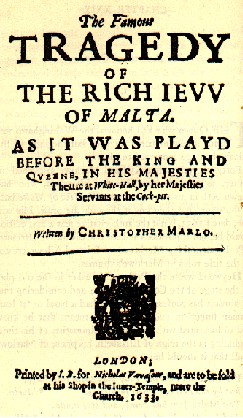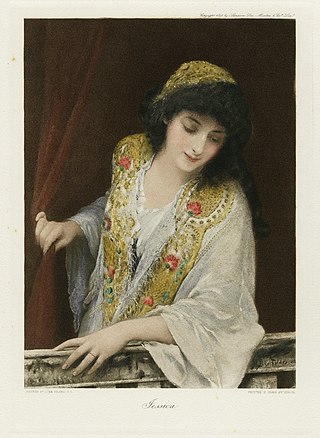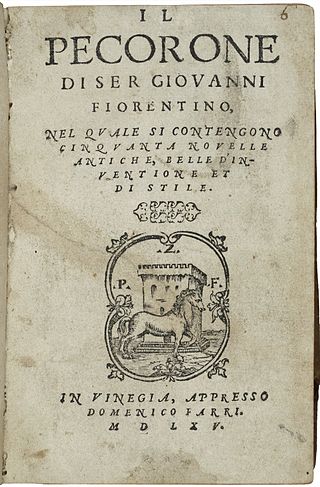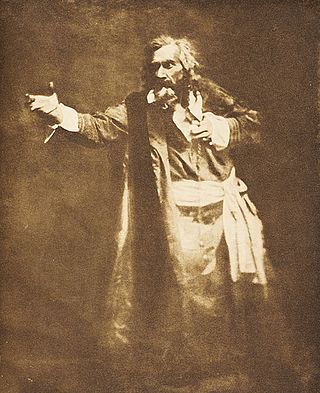
The Merchant of Venice is a play by William Shakespeare, believed to have been written between 1596 and 1598. A merchant in Venice named Antonio defaults on a large loan taken out on behalf of his dear friend, Bassanio, and provided by a Jewish moneylender, Shylock, with seemingly inevitable fatal consequences.

The Jew of Malta is a play by Christopher Marlowe, written in 1589 or 1590. The plot primarily revolves around a Maltese Jewish merchant named Barabas. The original story combines religious conflict, intrigue, and revenge, set against a backdrop of the struggle for supremacy between Spain and the Ottoman Empire in the Mediterranean that takes place on the island of Malta. There has been extensive debate about the play's portrayal of Jews and how Elizabethan audiences would have viewed it.

The Merchant of Venice is a 2004 romantic drama film based on Shakespeare's play of the same name. It is the first full-length sound film in English of Shakespeare's play—other versions are videotaped productions which were made for television, including John Sichel's 1973 version and Jack Gold's 1980 BBC production.

Roderigo Lopes served as a physician-in-chief to Queen Elizabeth I of England from 1581 until his death by execution, having been found guilty of plotting to poison her. A Portuguese converso or New Christian of Jewish ancestry, he is the only royal doctor in English history to have been executed, and may have inspired the character of Shylock in Shakespeare's The Merchant of Venice, which was written within four years of his death.
Iscah is the daughter of Haran and the niece of Abraham in the Book of Genesis. The passage in which Iscah is mentioned is extremely brief. As a result rabbinical scholars have developed theories to explain it, typically adopting the claim that Iscah was an alternate name for Sarah (Sarai), the wife of Abraham, particularly that it denoted her role as a prophetess.

Portia is a female character and protagonist in The Merchant of Venice by William Shakespeare. In creating her character Shakespeare drew from the historical figure of Porcia, the daughter of Cato the Younger, as well as several parts of the Bible.

Libby Appel served as the fourth artistic director of the Oregon Shakespeare Festival (OSF) from 1995 to June 2007. Appel directed more than 25 productions at OSF, and her artistic vision influenced the 11 plays presented each year during her tenure. Despite the festival's name, she placed increased emphasis on new works. “We have made major connections with world playwrights, artists whose voices we’re particularly interested in.” Appel said. “We commission playwrights, we develop plays here; we have playwrights in residence. We’re a world force now, and I’m really proud of that.”

Antonio is one of the central characters in William Shakespeare's play The Merchant of Venice. He is portrayed as a wealthy and respected merchant residing in Venice, known for his generosity and melancholic disposition. Antonio is a close friend of Bassanio, another important character in the play, and their bond serves as a crucial element of the story.
The Maori Merchant of Venice is a 2002 New Zealand drama film in the Māori language, directed by Don Selwyn.
Yasser is a play by Moroccan-born Dutch novelist, playwright and journalist Abdelkader Benali. It was written in 2001, and describes the challenges and adversities faced by a Palestinian actor in playing the role of Shylock in Shakespeare's The Merchant of Venice.

The Merchant of Venice is a 1969 drama short film directed by Orson Welles based on William Shakespeare's play of the same name. While actually completed, it is frequently cited as an unfinished film, though better described as a partially lost film due to the loss of film elements.
Janet Ann Adelman was an American Shakespeare scholar, literary critic, and professor of English at the University of California, Berkeley.
Shylock is a monologue in one 80-minute act written by Canadian playwright Mark Leiren-Young. It premiered at Bard on the Beach on August 5, 1996, where it was directed by John Juliani and starred popular Canadian radio host, David Berner. Its American debut was in 1998 at Philadelphia’s Walnut Street Theatre where it was directed by Deborah Block, starred William Leach and was “Barrymore Recommended.” It has since been produced at theatres, Shakespeare Festivals and Fringes throughout Canada and the US, was translated for a production in Denmark and has been staged twice by the original actor, Berner, in Venice. A Czech translation by Jitka Sloupova ran in Prague from 2016-2019 at Divadlo Na Jezerce and starred Milan Kňažko.

Shylock is a fictional character in William Shakespeare's play The Merchant of Venice. A Venetian Jewish moneylender, Shylock is the play's principal villain. His defeat and conversion to Christianity form the climax of the story.

The Merchant of Venice is an opera by André Tchaikowsky (1935–1982) to a libretto, based on the Shakespeare play, by John O'Brien. Written between 1968 and 1982, it was first performed in 2013 at the Bregenz Festival. The British premiere was presented by the Welsh National Opera in September 2016.

The Merchant of Venice is a 1961 Australian television adaptation of the play by William Shakespeare that aired on 13 September 1961 in Sydney, and on 25 October 1961 in Melbourne.

Jessica is the daughter of Shylock, a Jewish moneylender, in William Shakespeare's The Merchant of Venice. In the play, she elopes with Lorenzo, a penniless Christian, and a chest of her father's money, eventually ending up in Portia and Bassanio's household. In the play's dramatic structure, Jessica is a minor but pivotal role. Her actions motivate Shylock's vengeful insistence on his "pound of flesh" from Antonio; her relationships with Lorenzo and Shylock serve as a mirror and contrast to Portia's with Bassanio and with her father; her conversion to Christianity is the end of Shylock's line's adherence to the Jewish faith.

Il Pecorone, often referred to in English as The Golden Eagle, is an Italian novella written between 1378 and 1385 by Giovanni Fiorentino. It was written in a style influenced by the Decameron of Giovanni Boccaccio, the Golden Legend collection of saint lives, the Seven Sages of Rome or the Gemma ecclesiastica of Giraldus Cambrensis. For its historical facts, however, it relies on the Nuova Cronica of Giovanni Villani.

The Merchant is a 1976 play in two acts by the English dramatist Arnold Wesker. It is based on William Shakespeare's The Merchant of Venice, and focuses on the Jewish Shylock character, that play's principal antagonist.
Bassanio is a fictional character in Shakespeare's The Merchant of Venice.














